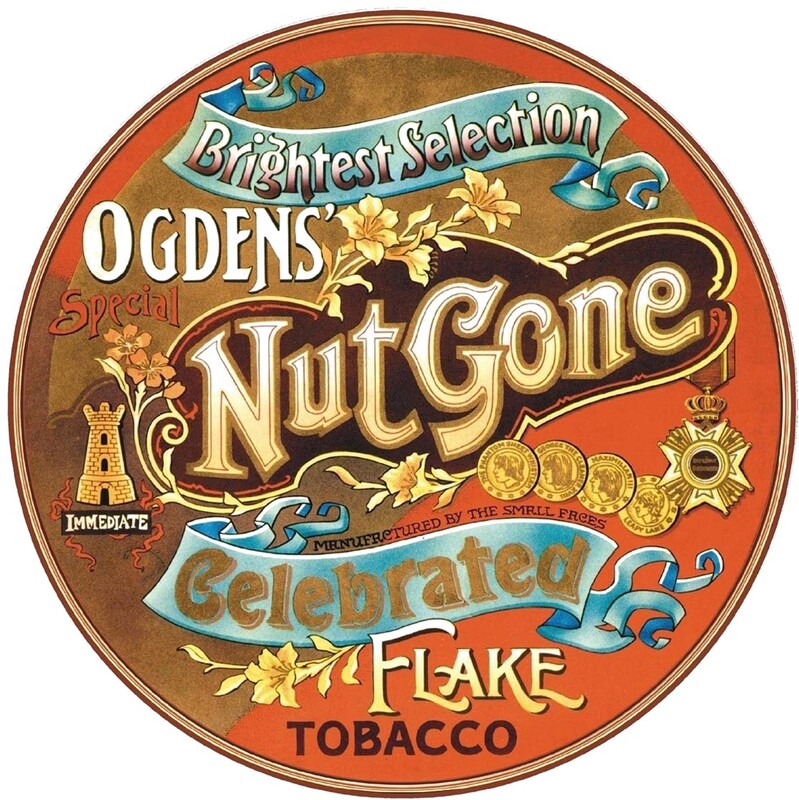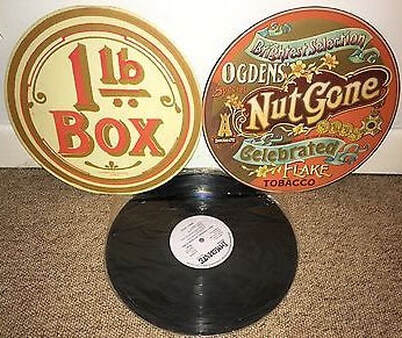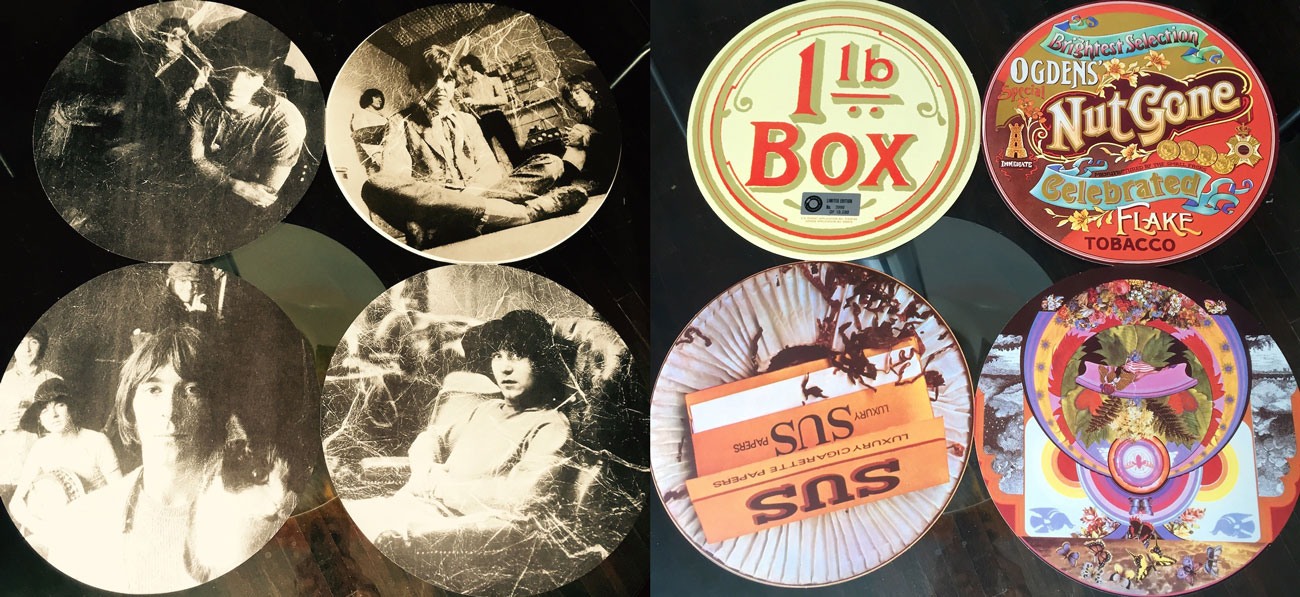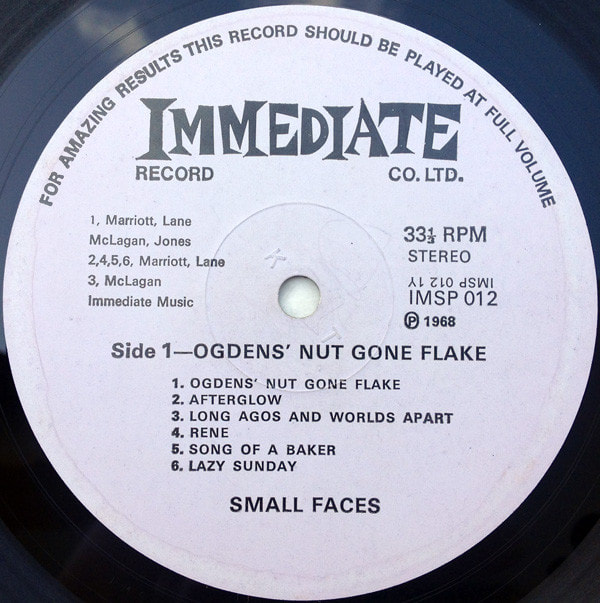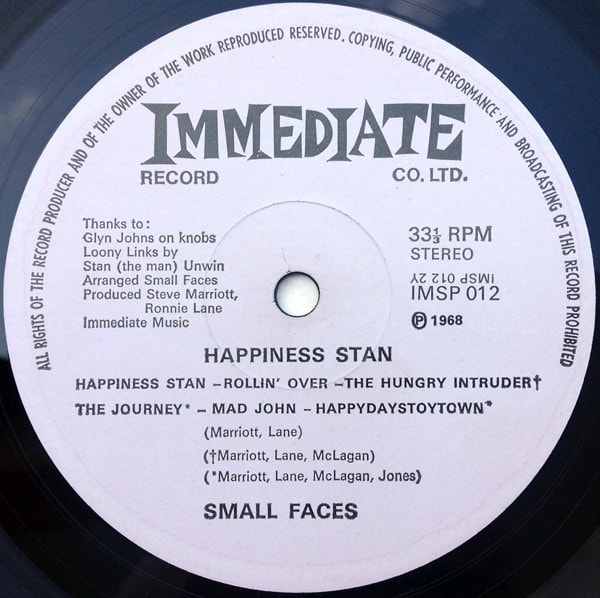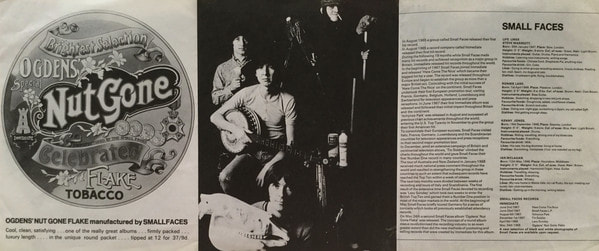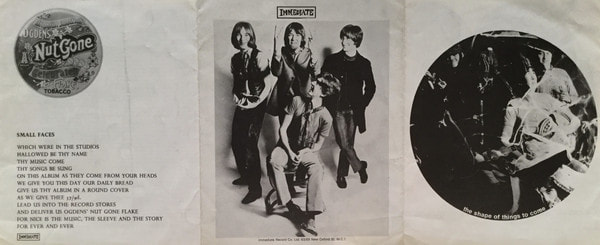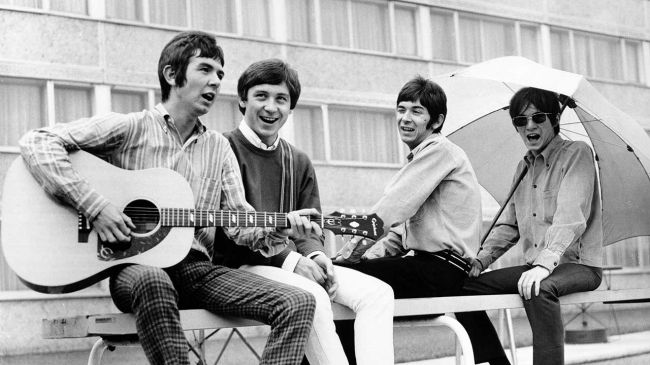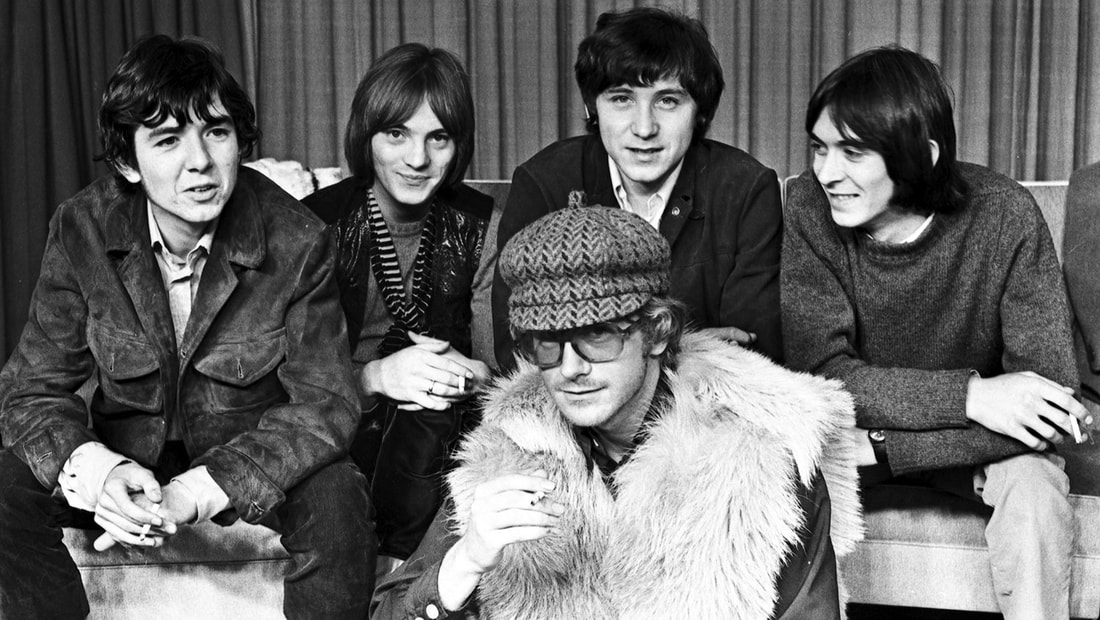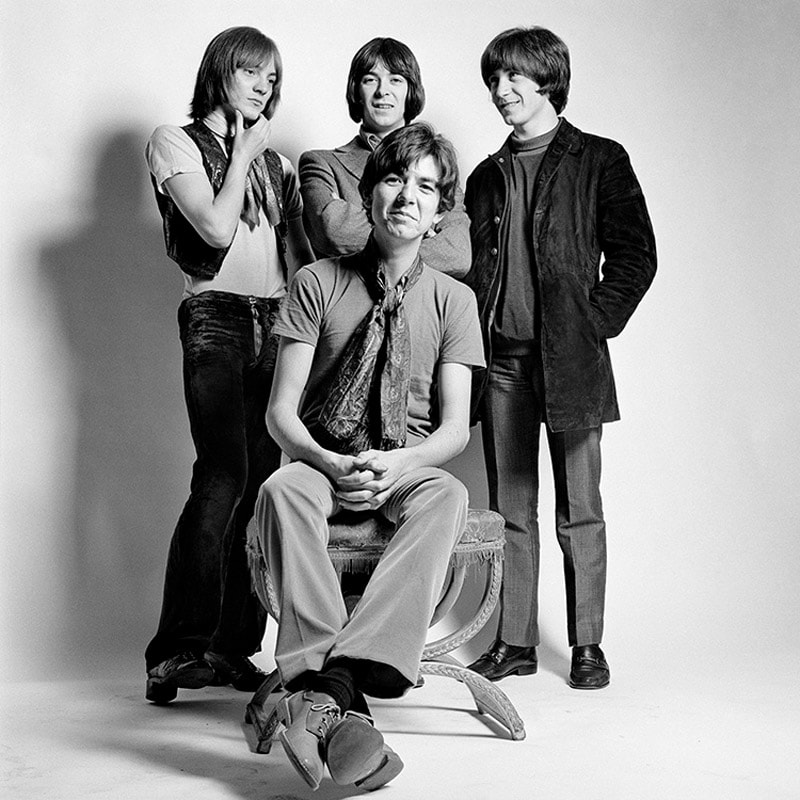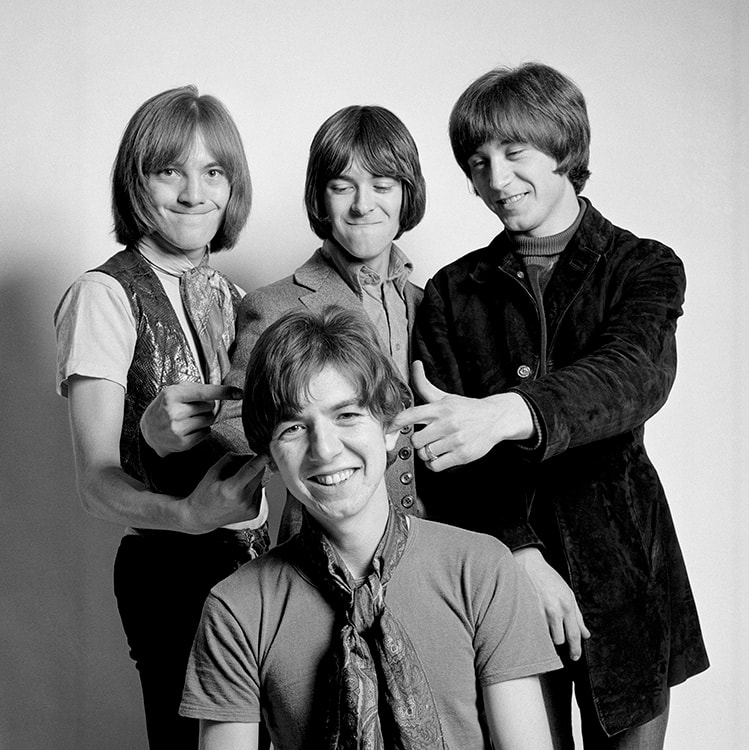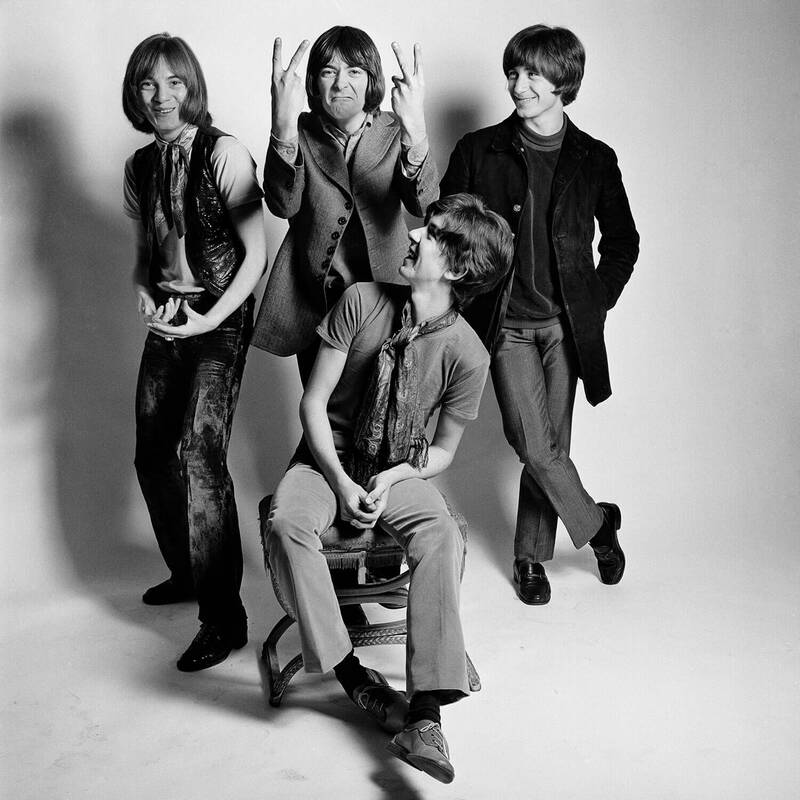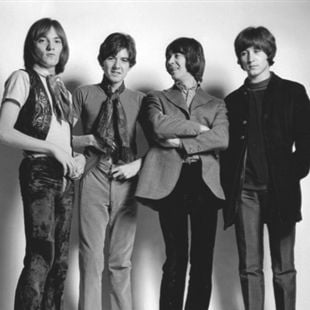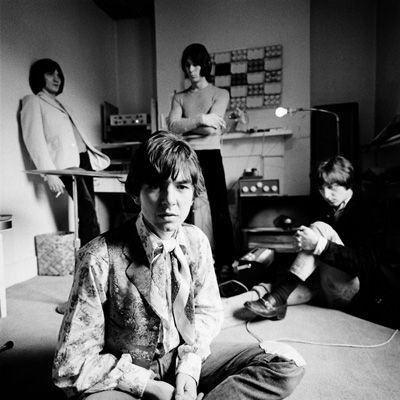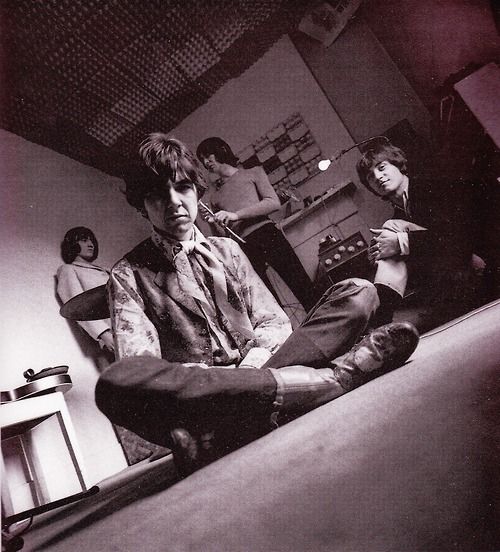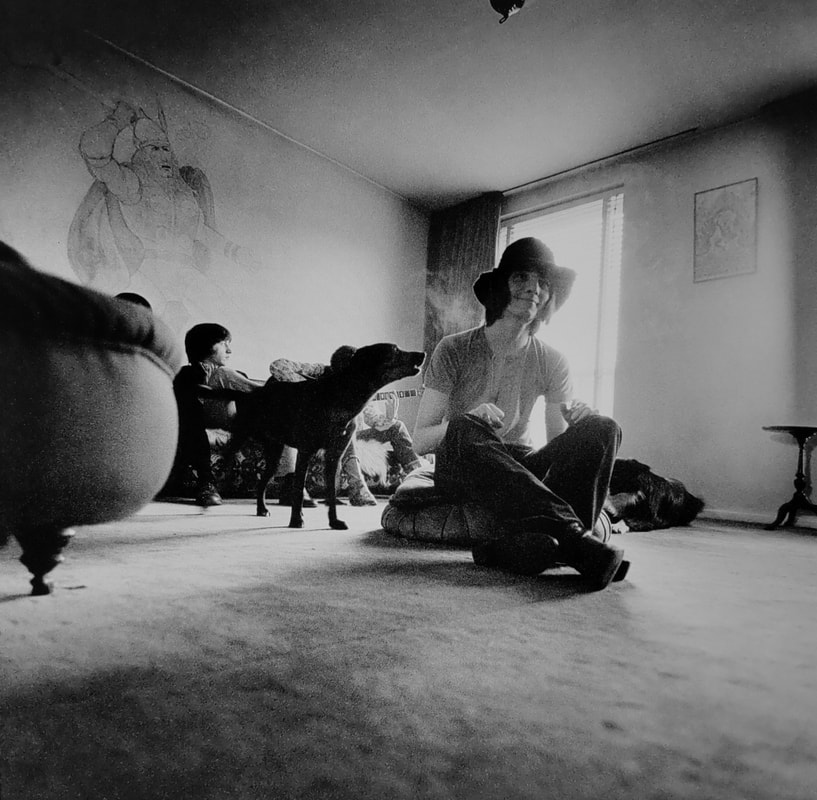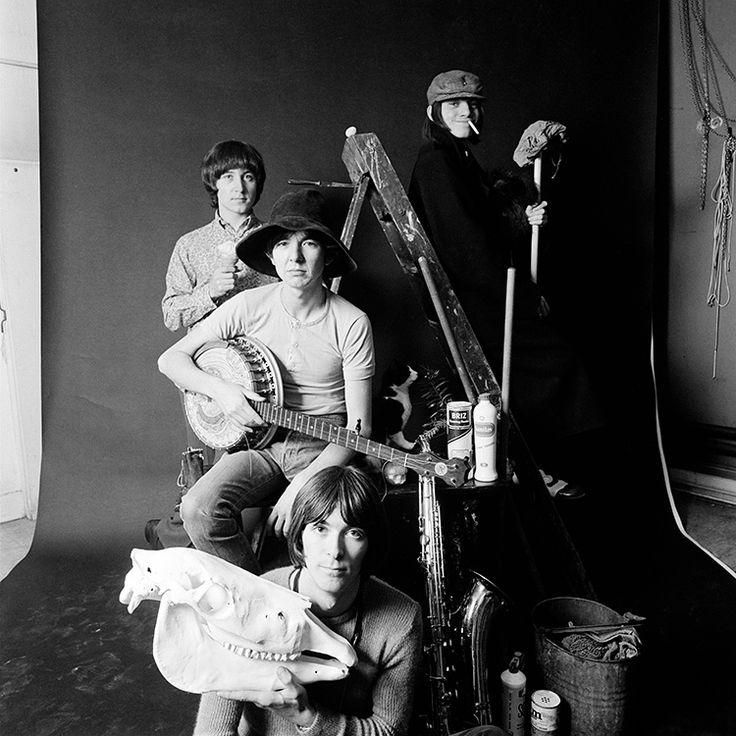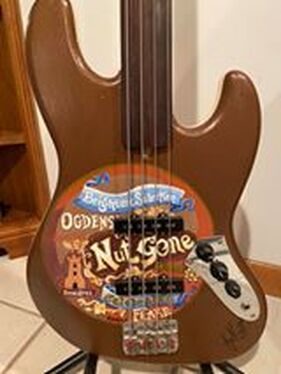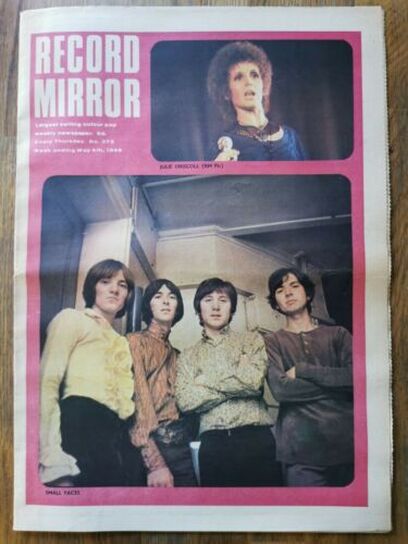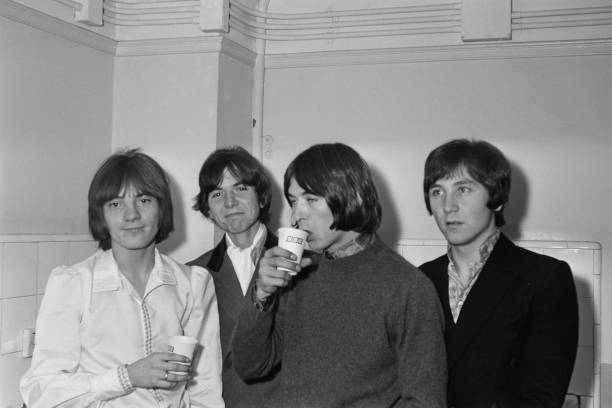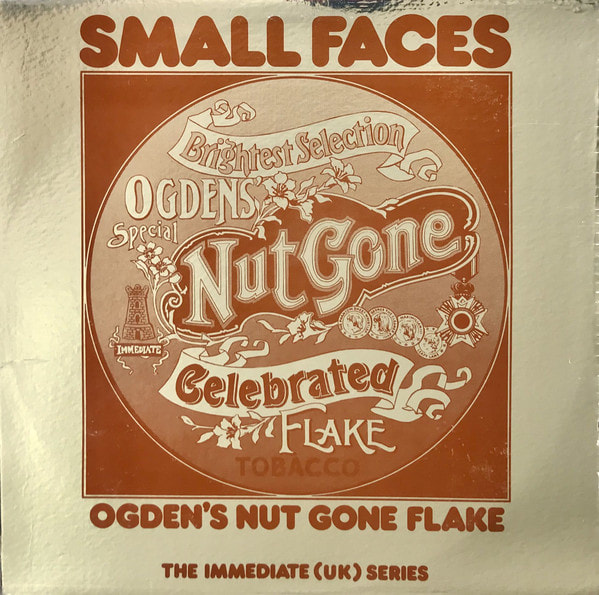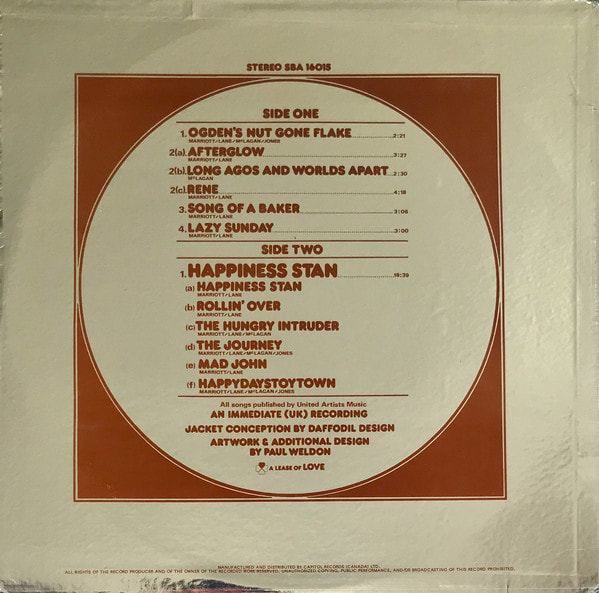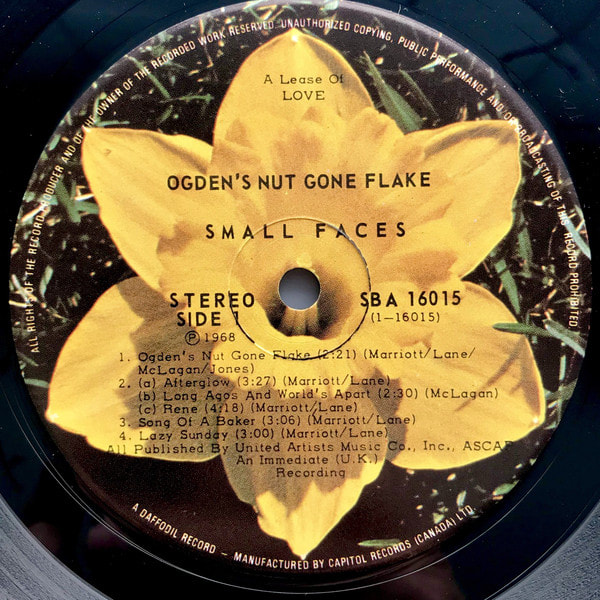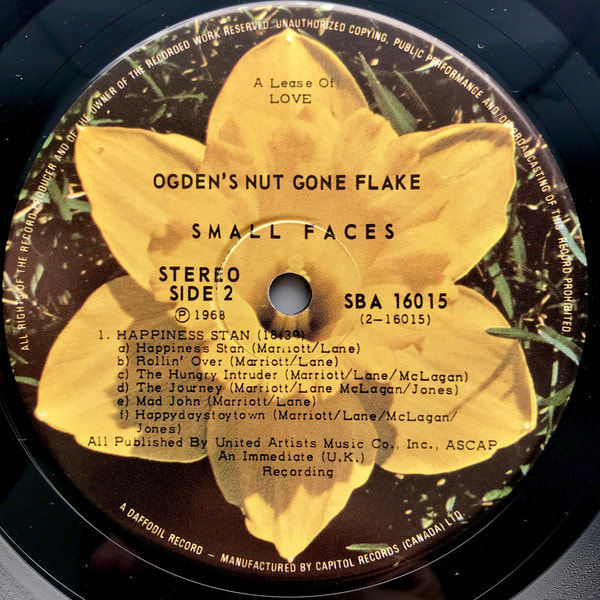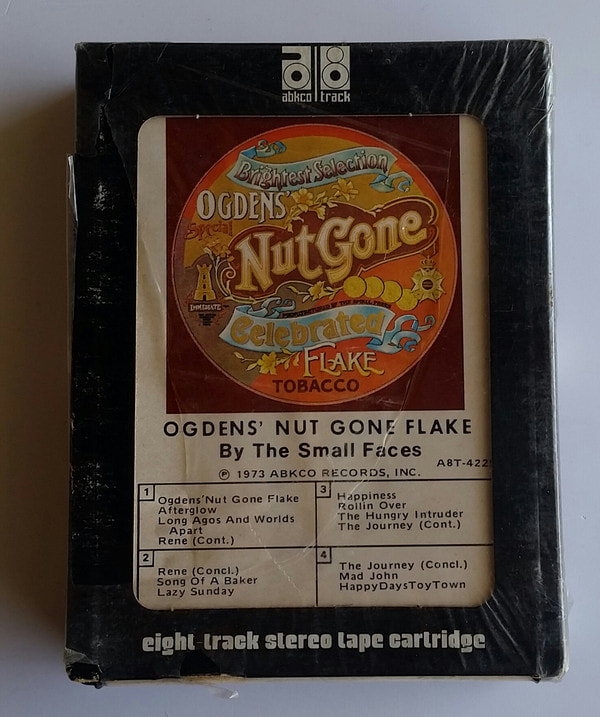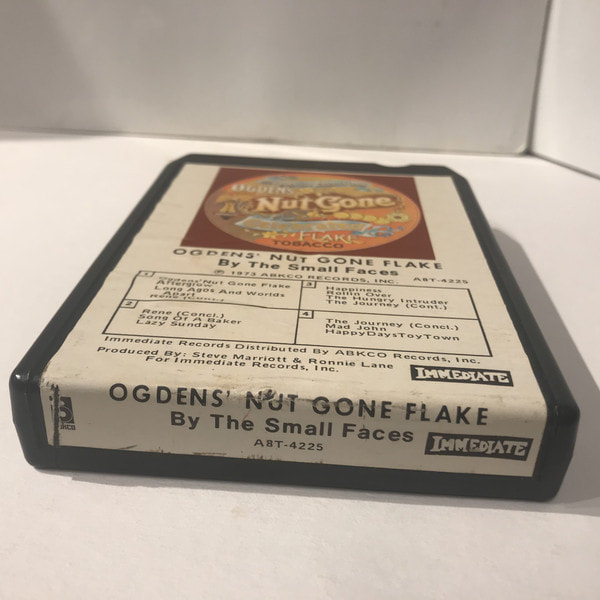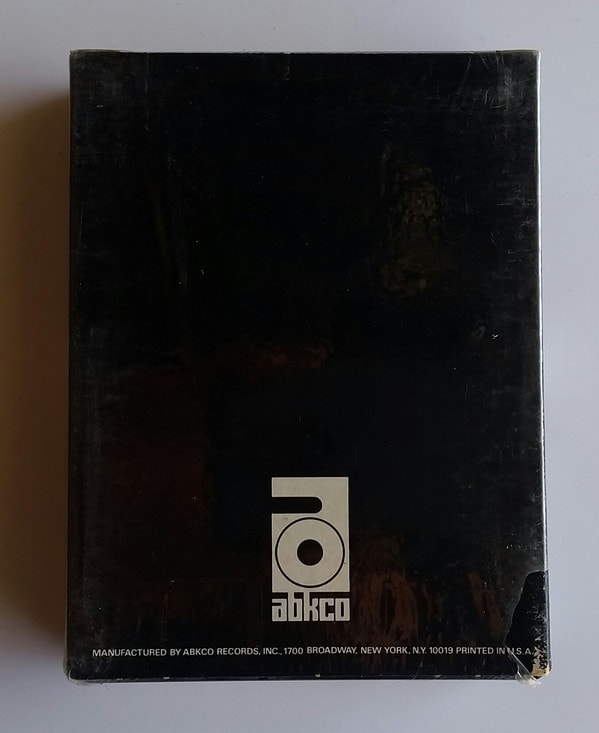Small Faces - Ogdens' Nut Gone Flake Album (1968)
This page is a work in progress
This page is a work in progress
Small Faces - Ogdens' Nut Gone Flake Album (1968)
Ogdens' Nut Gone Flake is the third (and final) studio album and the first concept album by
English rock band Small Faces. Released on May 24, 1968, their Ogdens' LP
peaked at number one on the UK Album Charts on June 29th,
where it remained for a total of six weeks. Ogdens' Nut Gone Flake reached No. 159 in the US.
English rock band Small Faces. Released on May 24, 1968, their Ogdens' LP
peaked at number one on the UK Album Charts on June 29th,
where it remained for a total of six weeks. Ogdens' Nut Gone Flake reached No. 159 in the US.
Small Faces - Ogdens' Nut Gone Flake Album (1968)
|
Small Faces - Ogdens' Nut Gone Flake Album (1968)
Small Faces' concept studio album; Small Faces third and last studio album Recorded: October 1967 – April 1968 Recorded at: at Olympic and Trident studios, London Released: May 24, 1968 Label: Immediate LP Length: 38:27 (Wiki) (152 versions) |
Listen to Small Faces Ogdens' Nut Gone Flake (1968) on Spotify!
Remastered in 2018 in both mono and stereo!
https://open.spotify.com/album/2pM93DS0vpM3wt6ooVx5LS
Remastered in 2018 in both mono and stereo!
https://open.spotify.com/album/2pM93DS0vpM3wt6ooVx5LS
Small Faces Ogdens' Nut Gone Flake LP 1968 UK - 1st Press
Small Faces - Ogdens' Nutgone Flake Album (1968) Personnel:
|
Credits
Engineer [Knobs] – Glyn Johns Producer – Ronnie Lane, Steve Marriott Voice [Loony Links] – Stan (The Man) Unwin* Written-By: McLagan* (tracks: A1, A3, B4, B6), Jones* (tracks: A1, B6) Lane* (tracks: A1, A2, A4 to B6), Marriott* (tracks: A1, A4 to B6), Marriot* (tracks: A2) Notes: Lilac Immediate labels with the writing credits separate from the track titles. Released in a circular sleeve that folds open into five panels. EMI pressed KT tax stamp on label |
Small Faces Ogdens' Nutgone Flake Album Tracklist
All songs on Ogdens' Nutgone Flake were written by Steve Marriott and Ronnie Lane, except where noted
Discs one and three of the deluxe edition contain the original album in stereo and mono, respectively.
|
Side One
1. "Ogdens' Nut Gone Flake" 2:26 Marriott, Lane, McLagan, Jones 2. "Afterglow" 3:31 3. "Long Agos and Worlds Apart" 2:35 McLagan 4. "Rene" 4:29 5. "Song of a Baker" 3:15 6. "Lazy Sunday" 3:05 |
Side Two, titled "Happiness Stan"
1. "Happiness Stan" 2:35 2. "Rollin' Over" 2:50 3. "The Hungry Intruder" 2:15 Marriott, Lane, McLagan 4. "The Journey" 4:12 Marriott, Lane, McLagan, Jones 5. "Mad John" 2:48 6. "HappyDaysToyTown" 4:17 Marriott, Lane, McLagan, Jones |
Small Faces Ogdens' Nutgone Flake - Wikipedia (excerpts)
https://en.wikipedia.org/wiki/Ogdens%27_Nut_Gone_Flake
https://en.wikipedia.org/wiki/Ogdens%27_Nut_Gone_Flake
Ogdens' Nutgone Flake ultimately became the group's final studio album during their original incarnation
(and their last album, containing solely new material until Playmates was released in 1977, without Ronnie Lane).
(and their last album, containing solely new material until Playmates was released in 1977, without Ronnie Lane).
Widely regarded as a classic album, Ogdens' Nutgone Flake featured an innovative round cover, the first of its kind, designed to resemble an antique tobacco tin. The title and the design of the distinctive packaging was a parody of Ogden's Nut-brown Flake, a brand of tobacco that was produced in Liverpool from 1899 onwards by Thomas Ogden.
Critics were enthusiastic, and the album sold well, but the band were confronted by the practical problem that they had created a studio masterpiece which was virtually impossible to recreate on the road.
Small Faces Ogdens' Nutgone Flake - Background
|
Side one of the album is a mix of early heavy rock, with "Song of a Baker", psychedelic cockney knees-up songs "Lazy Sunday" and "Rene", the opening instrumental title track (which resembles their second single "I've Got Mine", which was a flop in 1965), and the soul-influenced ballad "Afterglow",as it is called on the LP, but is titled "Afterglow of Your Love" on the subsequent single and some compilations (the single version of the song - released in March 1969 almost a year after it was recorded and after the group's disbandment was officially announced - was also presented in a radically-different mix that eschewed the LP version's acoustic opening, altered the song's tempo and extended the instrumental coda).
Side two of the LP is based on an original fairy tale about a boy called Happiness Stan, narrated by Stanley Unwin in his unique "Unwinese" gobbledegook. Unwin observed the band at work and at play in the studio, and picking up on their modern slang he incorporated it into his inventively-surreal narrative. Unwin was not the band's first choice for narrator – originally they had wanted the popular but mercurial absurdist comedian Spike Milligan to narrate the piece, but negotiations floundered early and the more affable and amenable Unwin stepped in to everyone's eventual satisfaction.
The fairy tale follows Stan in his quest to find the missing half of the moon, after seeing a half-moon in the sky one night. Along the way, he saves a fly from starvation, and in gratitude the insect tells him of someone who can answer his question and also tell him the philosophy of life itself. With magic power, Stan intones, "If all the flies were one fly, what a great enormous fly-follolloper that would bold," and the fly grows to gigantic proportions. Seated on the giant fly's back, Stan takes a psychedelic journey to the cave of Mad John the Hermit, who explains that the moon's disappearance is only temporary, and demonstrates by pointing out that Stan has spent so long on his quest that the moon is now full again. He then sings Stan a cheerful song about the meaning of life.
Because of the album's complexities, it was never performed live; it was performed as a whole once on the BBC's television programme Colour Me Pop on Friday 21 June 1968. Songs featured were "Song of a Baker", "Happiness Stan", "Rollin' Over", "The Hungry Intruder", "The Journey", "Mad John" and "Happydaystoytown". Although the band mimed to the studio recordings, their microphones were left on to capture ad libs.
|
Enjoy the theatrical side of Ogdens' Nut Gone Flake performed as a whole, one time only,
on the BBC's television programme Colour Me Pop, Friday June 21, 1968
(25:52)
on the BBC's television programme Colour Me Pop, Friday June 21, 1968
(25:52)
CLIPS - Ogdens' Nut Gone Flake performed on the BBC's Colour Me Pop, Friday June 21, 1968
|
Small Faces "Song Of A Baker"
BBC2 Colour Me Pop ~ 1968 |
|
See these Small Faces' and other Ronnie Lane videos at YouTube
https://www.youtube.com/channel/UC_JGehVbK7jcs-tef6qVP2g/videos
https://www.youtube.com/channel/UC_JGehVbK7jcs-tef6qVP2g/videos
Stanley Unwin on Small Faces
How did Stanley Unwin find working with the Small Faces?
He loved it. They really wanted him involved because they’d just heard his advert for Gale’s Honey (‘Sunnyglow in the pureymost…’) and they realised that he’d be a perfect fit for ‘Happiness Stan’. They gave him a script and he ‘translated’ it into ‘Unwinese’ there and then off the top of his head – after they’d persuaded him to add in a few ‘stoned out’ and ‘yeah, man’ references! Ronnie Lane sent him a note not long after the recording which said: ‘Thanks very much for being such a groove’.
Stanley was often asked whether he thought ‘Ogdens’ was a bit of a comedown. He’d always put them straight saying that he regarded working with the boys as a real compliment. Ronnie Lane and Ian McLagan still kept in touch with him for years after.
Small Faces Ogdens' Nutgone Flake - Recording
The recording of Ogdens' Nut Gone Flake spanned over approximately five months, with most of its work done in the spring of 1968 at Olympic Studios in Barnes, London. The earliest recording aimed at an album release was the track "Call It Something Nice", which was recorded on October 21, 1967 at Olympic, making this the earliest session for this particular album. This track, however, did not end up on its release, later being issued for the first time on the compilation The Autumn Stone in 1969.
Recording panned over through the remainder of 1967, with two known tracks started either in November or December and intended for a single but ultimately not released in this format: an original, "Rollin' Over"
(initially titled "Bun in the Oven") as the A-side, and a cover, "Every Little Bit Hurts", as the B-side, written by
Ed Cobb and made famous by Brenda Holloway. The latter track features Steve Marriott on piano instead of his usual guitar, and Ian McLagan on Hammond organ; it was, again, not released on the final album and did not appear until the early 1990s. The former track was worked on further into the spring of 1968, with Marriott tracking two attempts at a new lead vocal, one ending up on the mono release and one on the stereo (he duets with himself on the verses, singing both harmonies).
(initially titled "Bun in the Oven") as the A-side, and a cover, "Every Little Bit Hurts", as the B-side, written by
Ed Cobb and made famous by Brenda Holloway. The latter track features Steve Marriott on piano instead of his usual guitar, and Ian McLagan on Hammond organ; it was, again, not released on the final album and did not appear until the early 1990s. The former track was worked on further into the spring of 1968, with Marriott tracking two attempts at a new lead vocal, one ending up on the mono release and one on the stereo (he duets with himself on the verses, singing both harmonies).
After the group returned from their ill-fated tour of Oceania with The Who in January 1968, they started heavy recording sessions on the album, most being done through February and March.
One of the only songs not recorded at Olympic Studios was the track "The Journey", recorded at Trident Studios, London in February, which reversed the roles of Ronnie Lane and Steve Marriott who played guitar and bass, respectively.
Sessions wrapped on April 3, 1968 (two days before the release of the "Lazy Sunday" / "Rollin' Over" single) at Olympic with the recording of "Mad John" and the out-take "A Collibosher" (which was released again on the posthumous compilation The Autumn Stone). Mixing was completed by Marriott and Lane through April and May also at Trident Studios.
Small Faces Ogdens' Nutgone Flake - Packaging
The album Ogdens' Nutgone Flake was originally released on vinyl in a circular novelty package of a metal replica of a giant tobacco tin, inside which was a poster created with five connected paper circles with pictures of the band members. This proved too expensive and not successful as the tins tended to roll off of shelves and it was quickly followed by a paper/card replica with a gatefold cover.
Two limited-edition CD releases (including a three-disc deluxe edition in 2006 that included the original mono mix of the album on CD for the first time) went even further by packaging the disc(s) in a circular tin (as the original vinyl release had). Most CD releases use conventional packaging, superimposing the circular artwork on a square booklet.
The award-winning artwork for the album was done by Nick Tweddell and Pete Brown, who were art school friends of Ian Mclagan and who had also played in a band with Mclagan called The Muleskinners. Album cover illustration was by Harry Willock, 1969 D&AD Silver Award winning album cover. Early pressings of XTC's The Big Express (1984) were similarly packaged in a round sleeve in tribute to the Small Faces album.
In 1991 Ogdens' Nutgone Flake was ranked number 21 on Rolling Stone's 100 Greatest Album Covers
https://rateyourmusic.com/list/fedderedder/rolling_stones_100_greatest_album_covers/
https://www.vinylworld.org/collection/Rolling-Stones-100-Greatest-Album-Covers/
https://rateyourmusic.com/list/fedderedder/rolling_stones_100_greatest_album_covers/
https://www.vinylworld.org/collection/Rolling-Stones-100-Greatest-Album-Covers/
Small Faces Ogdens' Nutgone Flake - Controversy
To promote Ogdens' Nutgone Flake, Immediate Records issued an advertisement that parodied the
Lord's Prayer. This caused an uproar in the British press, and outraged readers wrote in to voice their anger.
It read:
Lord's Prayer. This caused an uproar in the British press, and outraged readers wrote in to voice their anger.
It read:
Small Faces
Which were in the studios
Hallowed by thy name
Thy music come
Thy songs be sung
On this album as they came from your heads
We give you this day our daily bread
Give us thy album in a round cover as we give thee 37/9d
Lead us into the record stores
And deliver us Ogdens' Nut Gone Flake
For nice is the music
The sleeve and the story
For ever and ever, Immediate
Which were in the studios
Hallowed by thy name
Thy music come
Thy songs be sung
On this album as they came from your heads
We give you this day our daily bread
Give us thy album in a round cover as we give thee 37/9d
Lead us into the record stores
And deliver us Ogdens' Nut Gone Flake
For nice is the music
The sleeve and the story
For ever and ever, Immediate
Regarding the advert, Steve Marriott said, "We didn't know a thing about the ad until we saw it in the music papers. And frankly we got the horrors at first. We realize that it could be taken as a serious knock against religion. But on thinking it over, we don't feel it is particularly good or bad. It's just another form of advertising. We're not all that concerned about it. We're more concerned in writing our music and producing our records."
Small Faces Ogdens' Nutgone Flake - Vinyl and CD Versions
The original Ogdens' Nutgone Flake vinyl album includes a segue between the end of "Afterglow" and the beginning of "Long Agos And Worlds Apart". Most CD editions have a different stereo mix, and use the single version of "Afterglow" without the segue. There is also a segue between "Long Agos and Worlds Apart" and "Rene", and this is retained on the CD. Some CD editions also include one or more bonus tracks.
The US Immediate vinyl LP looked the same as the British original, but was printed on flimsy paper stock. The CBS/Immediate issue was always sold in a plastic bag with a foldover snap. The sound on the US release was not as bright as the UK release or most subsequent CD issues.
In 1989, Castle Communications released a single disc commemorative "tobacco tin" version that included a 'live' version of Tin Soldier as well as several table coasters replicating the cover.
The 2006 Castle Music/Sanctuary Records 3-disc "tobacco tin" Special Edition includes fully remastered mono and stereo mixes complete with segue, plus an episode of the BBC Radio documentary series Classic Albums in which the band discuss the making of the album.
A second 3-disc Deluxe Edition was released in 2012 on Charly Records, this time, overseen by surviving members Ian McLagan and Kenney Jones, and featured newly remastered mono and stereo mixes complete with segue, with the third disc full of outtakes and alternative takes, versions and mixes, including some specially mixed from newly discovered original session tapes. In countries other than the UK, however, the 2012 3-disc version was a limited edition and was replaced a year later by a two CD version with conventional packaging, and the stereo mix is omitted completely from the package.
-On many reissues, the cover design still spells the title as Ogdens' , but the label and sleeve copy gives it as Ogden's.
-The vinyl LP was reissued in 2015 for Record Store Day.
-There was also a major re-release of Ogdens' Nutgone Flake in 2018.
Listen to in both mono and stereo: https://open.spotify.com/album/2pM93DS0vpM3wt6ooVx5LS
Listen to in both mono and stereo: https://open.spotify.com/album/2pM93DS0vpM3wt6ooVx5LS
-In 2000 Q magazine placed Ogdens' Nut Gone Flake at number 52 in its list of the 100 Greatest British Albums Ever https://www.rocklistmusic.co.uk/steveparker/classicrock2.htm
-Ogdens' Nutgone Flake was featured in the book 1001 Albums You Must Hear Before You Die
https://www.rocklistmusic.co.uk/1001Albums.htm
https://www.rocklistmusic.co.uk/1001Albums.htm
Ogdens' Nutgone Flake was voted number 337 in the third edition of Colin Larkin's All Time Top 1000 Albums (2000) https://www.rocklistmusic.co.uk/virgin_1000_v3.htm
Ogdens' Nutgone Flake painted bass- by Tonya Marriott
from the Chuck Scarpello Collection
from the Chuck Scarpello Collection
Totally gone:
The story of the Small Faces' psychedelic masterpiece Ogdens’ Nut Gone Flake
from Louder Sound with extensive story-telling from Ian McLagan
The story of the Small Faces' psychedelic masterpiece Ogdens’ Nut Gone Flake
from Louder Sound with extensive story-telling from Ian McLagan
The Small Faces were at the forefront of British psychedelia in the late 60s with their career-peaking album Ogdens’ Nut Gone Flake, and all it took was one trip...
In 1966 The Small Faces were the ultimate embodiment of the metropolitan mod ideal. Four diminutive Jack-the-lads perpetually decked out in razor-sharp threads fresh from Carnaby Street. Rail-thin, hyperactive, mischievous; it was blatantly obvious to every ticket on the street that you didn’t get cheekbones like that from early nights and All-Bran.
Mum-friendly pop stars or not, The Small Faces were clearly quaffing large on whatever chemical indulgences Swinging London swung their way. To alleviate the boredom of a heavy provincial touring schedule, The Small Faces invariably took to the road with as many stimulants as were necessary to render rain-lashed Manchester club dates bearable: at first a little grass or hash; on occasion something a little speedier.
Then, shortly after Steve Marriott (guitar/vocals), Ronnie Lane (bass/vocals) and Ian McLagan (keyboards/vocals) moved into a shared Westminster apartment, a new drug entered their orbit that expanded their artistic remit almost beyond all recognition: LSD.
“We took our first trip in Westmoreland Terrace in early ’66,” remembers Ian McLagan. “And almost immediately started experimenting, using Chinese instruments and all sorts of sounds, to try and recreate a trip.”
By the following year the band’s singles output painted them as full-blown, unashamed drug evangelists. Though interestingly, July ’67’s lyrically blatant "Here Come The Nice" concerned scoring speed rather than acid; yet another weapon in the Faces’ extensive pharmaceutical armoury.
“It was weird that they allowed "Here Come The Nice" to come out at all,” smiles McLagan. “We were dabbling in all kinds of chemicals and Methedrine was one of them. We were wrong to have written about a speed dealer. They weren’t the nicest people. The guy you bought your hash from was usually just a head, but a speed dealer – like a coke or heroin dealer – was only interested in getting your money. It was quite different. They weren’t your friends.”
Just two months down the line from "Here Come The Nice", The Small Faces delivered one of the Summer Of Love’s defining statements, a psychedelically-inclined slice of quintessentially English whimsicality, characterised by a phasing effect courtesy of Olympic Studios engineer George Chkiantz. With a melody Marriott lifted straight from the hymn "God Be In My Head", it concerned a nettle-swathed, rail-side bombsite in Ilford called Itchycoo Park.
Having delivered the East End Good Vibrations, The Small Faces prepared to record the Cockney Sgt. Pepper. But first there was the small matter of an Australian package tour (alongside The Who and Paul Jones) to take care of.
“[The Australian press] gave me hell from the very beginning, because I’d just been busted,” Mac continues, “I was on my way to Athens for a holiday but never got further than Heathrow. As I was showing my passport they smelt the hash on me, searched and busted me. As soon as we landed in Australia we had a press conference, so we’re all lined up in front of the television cameras and the first guy goes: ‘Steve Marriott, Ronnie Lane, Kenney Jones, Ian McLagan… you’re the drug addict right?’”
Controversy continued to plague the tour to its conclusion. “On our way to New Zealand we had to stop off in Sydney. You couldn’t drink on internal flights back then, but one of Paul Jones’ Australian backing band passed a bottle around and the police were called. We weren’t even drinking but they arrested and held us in the first-class lounge where a waitress came straight up to us and said: ‘What would you like to drink?’
"So we drank. The police arrested us as soon as we arrived in New Zealand, but we ended up having a great time. Steve had his 21st birthday party; Keith [Moon] wrecked his room; it was business as usual.”
|
Some of the material eventually included on their seminal Ogdens’ Nut Gone Flake was already in the can by this point, but not enough for an entire album. So in the spring of 1968 The Small Faces hired cabin cruisers and took to the River Thames to write some more.
“We found a camaraderie we hadn’t had before; I was even allowed to be involved in the writing. "Long Agos And Worlds Apart" was only my second song. It was all about being high. My first song was "Up The Wooden Hills To Bedfordshire" and that was all about… being high. I think I only had two modes at the time, one was being high and being awake, and the other was being high and being asleep.”
So what, other than the very liberal usage of a cocktail of psychoactive substances, was driving this period of unprecedented creativity? According to McLagan, not the influence of the then blossoming American West Coast psych scene, that’s for sure.
|
“Most of the music that came out of San Francisco at that time gave me a bad trip,” asserts McLagan. “I thought it was wet; hopeless frankly. It seemed like they’d forgotten the groove, the soul. It was totally boring; we had nothing in common with those guys apart from the drugs.”
There’s no escaping the fact that Ogdens’ Nut Gone Flake defines a uniquely Small Faces brand of psychedelia. Above all, it’s very mod, and very English. The cover (a round tobacco tin mock-up), lyrical imagery and subject matter are all symptomatic of the Edwardian nostalgia so prevalent in London as mod went psychedelic. While iconic boutique Granny Takes A Trip dressed the era, Ogdens’' provided its soundtrack: a seamless collage of hallucinogenic blues shouting, pop-art ingenuity, agrarian folk whimsy and music hall chirpiness.
“Coming from the East End the other three had more of a link to the music hall than me,” admits Hounslow-born McLagan, “I’d seen Max Miller, The Crazy Gang when I was a kid, but Steve was a throwback. Apart from being a great blues and soul singer, he was a natural music-hall entertainer and that side was always bursting out of him. It’s a particularly English thing: The Kinks had it, The Who had it. Steve couldn’t help himself, he always had that sense of humour, while we thought we were all blues men, we were Max Miller wearing denim.”
The influence of the music hall on Marriott’s work was never more obvious than on Ogdens' most celebrated track, "Lazy Sunday": “Lyrically, that was all about Steve’s problems with his landladies, landlords and neighbours, which were ongoing,” Mac reveals, “He really was the worst neighbour, with dog shit everywhere and music all hours of the night at full volume.
"And musically, well, while we were on the Australian tour Bob Pridden, The Who’s sound guy – who was a very funny and humorous chap – had this little dance he’d do when we were hanging out that he’d accompany with this little ‘rootdedootdedoo’ tune, which ended up being part of Lazy Sunday.”
Making a feature of one’s cockney accent simply wasn’t done in ’68. Every vocalist in the UK seemed to have been in denial of their natural burr since the initial importation of rock’n’roll from America in the mid-50s, with a mid-Atlantic twang uniformly adopted by all. But Marriott (formerly the 13-year old Artful Dodger in the West End production of Lionel Bart’s Oliver!) not only reclaimed his linguistic heritage on "Lazy Sunday".
His rollicking performance on Rene – the bawdy tale of a dockside prostitute – was so strident as to be almost mockney. Here’s the song and performance Damon Albarn plundered for Blur’s career-reanimating "Sunday Sunday" single. How ironic is it that 1995’s Britpop crown was contested so fiercely by a pair of apparently diametrically opposed bands who were so clearly basing their careers on two different incarnations of the same core band: Blur as The Small Faces and Oasis as the band that would later grow out of them: The Faces.
“I like the fact that people have listened to us and taken something from us,” says Mac, “I’ve heard some of Blur’s stuff and really like it, and I like Oasis, but our biggest champion is Paul Weller. Our biggest champions back then were probably Rod Stewart and Ronnie Wood. They told us that Ogdens’' kept them going on their American tours with Jeff Beck. Rod and Woody’s sense of humour is just as mad and rooted in vaudeville as ours."
Further compounding Ogdens' matters was the other half of the Marriott/Lane songwriting partnership: “Ronnie, on the other hand, was more of a folkie,” McLagan continues, “ "Song Of A Baker", "The Hungry Intruder", "Mad John"; they all came from him more than Steve. He was already floating in the direction of the folkie he eventually proved to be.”
While Ogdens’' first side was only distinctive for the excellence of its material, the album’s entire second side was given over to a six-part song cycle, mostly written on the Thames, which told the tale of Happiness Stan’s search for the other half of the moon. Hardly grand opera, but in formative concept album terms, this missing link between The Who’s A Quick One While He’s Away and Tommy, predated The Pretty Things’ S.F. Sorrow by six months.
“It was Ronnie’s basic idea,” says Mac. ”The story was very thin but we soon made the songs fit. A Quick One was the light: Pete [Townshend’s] little rock opera convinced us that it could be done, so we did one of our own and Pete loved it.”
While the deeply psychedelicised story of Happiness Stan (who lived inside a rainbow in a small Victorian charabanc, by all accounts) was obviously pretty straightforward. After all, what could possibly be confusing about a saga made up of brief musical vignettes concerning grateful flies that band together to form makeshift aircraft, mad tramps, and that concludes with the philosophical assertion that: ‘Life is just a bowl of All-Bran, you wake up every morning and it’s there’?
|
It was felt that – for the benefit of the slightly less medicated – the services of a clarifying narrator should be engaged. With Marriott’s first choice for the role, ex-Goon Spike Milligan, unavailable, ‘Professor’ Stanley Unwin, an unlikely television star of the day (famously fluent in his own particular brand of gibberish known as Unwinese) got the job.
|
|
He turned out to be an inspired choice. “I don’t know who suggested Stanley, but boy, what a brilliant stroke,” says Mac. “He came down the studio and we were thrilled to meet him. He’d just hang around while we were going about our business, recording and chatting, and make notes. He picked up on the way we spoke – ‘Cool, man’ and all that – and although it was like a whole new language to him, he totally got it.
"We pointed out what we needed in the way of links and after a while he came back and tried a few things. [producer] Glyn Johns must have trimmed it down a bit because he couldn’t half rabbit on, but he was brilliant.”
A side from the often dizzying mix of musical styles and sound effects etched into its grooves, Ogdens’' Nutgone Flake was housed in a perfectly circular sleeve based on a vintage ’baccy tin, that was just right for clamping between your knees and rolling a recreational doobie on. The title, meanwhile, came as a byproduct of researching the artwork.
“Ogdens’ tobacco very kindly sent over all these scrapbooks with original labels pasted in,” remembers Mac, “We browsed through them and as soon as Steve saw this rectangular label for Ogdens’ Nut Brown Flake he went: ‘There it is: Nut Gone Flake, perfect.’ Someone copied and adjusted it into a round tin by hand and my pals from art school – Nick Tweddell and Pete Brown – painted the wonderful psychedelic collages inside with all the butterflies.”
Ogdens’ Nut Gone Flake topped the UK charts for six weeks in the summer of 1968, with "Lazy Sunday" stalled at No.2 in the singles charts behind Louis Armstrong’s "Wonderful World".
Yet despite outward appearances, all wasn’t wonderful in the world of The Small Faces. Firstly, the band weren’t pleased that Immediate had released "Lazy Sunday" as a single without their consent. Marriott considered it little more than a novelty song, and certainly not representative of Ogdens' as a whole. Secondly, while there was pressure on the band to play live, much of Ogdens' and their more recent singles ("Itchycoo Park", "Tin Soldier") were almost impossible to replicate outside of the studio.
In February 1969, just a month after The Small Faces’ live US debut, Steve Marriott quit the band.
“We were recording for the next record and things were falling apart bit by bit. Then he left,” says Mac. “It’s a shame because I think we could have made a better album than Ogdens'. We were well on the way to doing it. He and Ronnie were writing beautifully, but we’ll never know.”
So was the Happiness Stan concept a flash in the pan, a passing flirtation with the rock opera format, or perhaps the ex-Artful Dodger had ambitions to branch into musical theatre?
“If The Small Faces had stayed together I think that we probably would have done a whole concept album,” opines Mac. “I don’t think it’s ever been done properly. Tommy is a bit (snores)… long. I know (ex-Small Faces drummer) Kenney (Jones) is keen to animate Ogdens', but it needs to be developed and it would be great if someone could write some more songs. I’d be keen to look at developing the second side of the Ogdens' album into a proper show; a West End or Broadway thing, or maybe a movie.”
Ultimately, though generally accepted to be a high watermark of the English end of the genre, is Ogdens’ Nut Gone Flake actually psychedelic?
“No,” Mac states matter-of-factly. “We were over that; we weren’t taking acid when we were making it; you couldn’t get decent acid at that point. The age of acid was very short-lived. It was like the mod thing: mod was two years, max. The clothes weren’t there after a while because the fashion industry caught on and killed it with cheap, crappy imitations."
“Psychedelia was here and gone. For me personally it was that one big night we had in Westmoreland Terrace where I spent five hours or so drawing self portraits on the carpet and having the most wonderful trip. I was thinking: ‘Great, my whole life has changed.’ Then I went to sleep, woke up the next morning, felt a bit odd and then just went back to being ordinary again.”
So while much of Ogdens' creation was informed by the band’s experiences of LSD, it was very much forged in the afterglow of The Small Faces’ acid experimentation. In fact, at this point the whole notion of a cohesive psychedelic rock scene was little more than a journalistic contrivance to link all the bands together. It was a convenient, generic pigeonhole in which ingenious, progressive music of a certain vintage can be placed.
“The psychedelic scene was about as united as the punk scene,” says Mac. “Punk wasn’t just about one thing and neither was psychedelia. I was always into the blues, rock’n’roll, soul and r’n’b, acid didn’t change that, it was more like an excursion; a left turn before going back on track, and once we’d got over the initial rosy glow of acid it was back to soul music for us, because that’s what we did.”
So, in retrospect, did acid’s influence enable The Small Faces’ to create their defining moment in Ogdens’ Nut Gone Flake?
“Ogdens' was pretty good, it was adventurous, but we could have done a lot better.” Mac concludes, “Acid did change my life temporarily, but as far as the music went, acid was the worst thing that could have happened; because everyone was trying to recreate a trip, which is like trying to catch a cloud."
This feature originally appeared in a Classic Rock Psychedelic Special in 2008. Ian McLagan passed in 2014.
https://www.loudersound.com/features/totally-gone-the-story-of-the-small-faces-psychedelic-masterpiece-ogdens-nut-gone-flake
https://www.loudersound.com/features/totally-gone-the-story-of-the-small-faces-psychedelic-masterpiece-ogdens-nut-gone-flake
Small Faces Ogdens' Nutgone Flake - Reception
Allmusic Ogdens' Nut Gone Flake Album Review by Bruce Eder
There was no shortage of good psychedelic albums emerging from England in 1967-1968, but Ogdens' Nut Gone Flake is special even within their ranks. The Small Faces had already shown a surprising adaptability to psychedelia with the single "Itchycoo Park" and much of their other 1967 output, but Ogdens' Nut Gone Flake pretty much ripped the envelope.
British bands had an unusual approach to psychedelia from the get-go, often preferring to assume different musical "personae" on their albums, either feigning actual "roles" in the context of a variety show (as on the Beatles' Sgt. Pepper's Lonely Hearts Club Band album), or simply as storytellers in the manner of the Pretty Things on S.F. Sorrow, or actor/performers as on the Who's Tommy.
The Small Faces tried a little bit of all of these approaches on Ogdens' Nut Gone Flake, but they never softened their sound. Side one's material, in particular, would not have been out of place on any other Small Faces release -- "Afterglow (Of Your Love)" and "Rene" both have a pounding beat from Kenny Jones, and Ian McLagan's surging organ drives the former while his economical piano accompaniment embellishes the latter; and Steve Marriott's crunching guitar highlights "Song of a Baker." Marriott singing has him assuming two distinct "roles," neither unfamiliar -- the Cockney upstart on "Rene" and "Lazy Sunday," and the diminutive soul shouter on "Afterglow (Of Your Love)" and "Song of a Baker."
Some of side two's production is more elaborate, with overdubbed harps and light orchestration here and there, and an array of more ambitious songs, all linked by a narration by comic dialect expert Stanley Unwin, about a character called "Happiness Stan."
The core of the sound, however, is found in the pounding "Rollin' Over," which became a highlight of the group's stage act during its final days -- the song seems lean and mean with a mix in which Ronnie Lane's bass is louder than the overdubbed horns. Even "Mad John," which derives from folk influences, has a refreshingly muscular sound on its acoustic instruments.
Overall, this was the ballsiest-sounding piece of full-length psychedelia to come out of England, and it rode the number one spot on the U.K. charts for six weeks in 1968, though not without some controversy surrounding advertisements by Immediate Records that parodied the Lord's Prayer. Still, Ogdens' was the group's crowning achievement -- it had even been Marriott's hope to do a stage presentation of Ogdens' Nut Gone Flake, though a television special might've been more in order. (Scroll up. We gotcha covered.)
Small Faces - Ogdens' Nutgone Flake Album 1968 - Memories and Reviews
The Ark Blog - Forgotten Gems of Rock and Roll: Ogdens' Nut Gone Flake
26 April 2015
26 April 2015
If it were not for the Small Faces, I would have never written storytelling segments in my album. I have to give entire recognition to Ogdens’ Nut Gone Flake for the idea of a narrative parallel in Gizzy Limelight.
It’s a plain shame that we don’t spend our days at the record store to discover new music anymore because the first time I heard the Small Faces was in a record store in Japan. I was so intrigued by the opening instrumental song “Ogden’s Nut Gone Flake” that it was love at first hearing.
Then I heard a familiar voice on the following track “Afterglow Of Your Love” and instantly thought “This has got to be Steve Marriott!”. I was convinced it was Humble Pie. Close enough, but not quite. I was listening to what was to become the precursor of a powerful duo with Peter Frampton yet to come.
After asking the salesman about the artist currently playing, he presented me with this round record sleeve. When I looked at it, I knew this album had some sort of special place in rock history.
Ogdens’ Nut Gone Flake is the third studio album by the Small Faces released in 1968. Engineered and mixed by Glyn Johns, it has to be one of the most experimental mixes I’ve ever heard in the heavy use of dynamic panning and flanged/phased drums.
The story describes a psychedelic fairy tale narrated by comedian Stanley Unwin, that unwinds exclusively on side B of the record. The title of the album is a parodic reference to a brand of tobacco called Ogdens’ Nut-Brown Flake that was manufactured in Liverpool.
Nobody can deny the British pop rock staple that is “Lazy Sunday”, driven by the iconic Wurlitzer electric piano played by Ian McLagan. Not to mention the hard rock monument that is Ronnie Lane’s “Song Of The Baker”.
But what I admire the most is Steve Marriott’s extremely soulful and powerful voice that never seems to deceive me. His aura emanates in “Afterglow Of Your Love”, a song driven by the leading organ sound that transports the listener to another dimension of love.
I am very nostalgic of conceptual projects like these that would never become a reality in our current music industry, whether it being a circular sleeve, a storytelling album, an experimental mix or a controversial parodic marketing advertisement (see above).
Small Faces Ogdens' Nutgone Flake (1968) - Subsequent Re-Releases
There are over 150 versions of Ogdens' Nutgone Flake. At this time this section is not complete.
There are over 150 versions of Ogdens' Nutgone Flake. At this time this section is not complete.
All versions in this section have been located here https://www.discogs.com/master/view/16374
Small Faces - Ogdens' Nutgone Flake LP Canada Re-release (1972)
This is a 1972 reissue by Daffodil Records (active 1970-1978).
Back cover and labels: "A Lease Of LOVE"
Back cover and labels: "A Lease Of LOVE"
Manufactured By – Capitol Records (Canada) Ltd.
Distributed By – Capitol Records (Canada) Ltd.
Published By – United Artists Music Co., Inc.
Distributed By – Capitol Records (Canada) Ltd.
Published By – United Artists Music Co., Inc.
Small Faces - Ogdens' Nutgone Flake 8-Track Cartridge US Re-release (1973)
Record Company – ABKCO Records, Inc.
https://mankowitz.com/galleries/the-60s-gallery/page/1/
https://duckduckgo.com/?q=Small+Faces+Ogdens+1968+Gered+Mankowitz
https://duckduckgo.com/?q=Small+Faces+Ogdens+1968+Gered+Mankowitz
https://www.musicpriceguide.com/17339/THE-SMALL-FACES-Ogdens-Nut-Gone-Flake-LP-1968-UK-1st-Press-.html
https://www.popsike.com/SMALL-FACES-Ogdens-Nut-Gone-Flake-1968-MONO-1st-Press/4041343394.html
https://www.popsike.com/SMALL-FACES-Ogdens-Nut-Gone-Flake-1968-MONO-1st-Press/4041343394.html
https://greatwen.com/2018/10/16/the-small-faces-and-colour-me-pop/
https://dangerousminds.net/comments/the_small_faces_perform_ogdens_nut_gone_flake_on_colour_me_pop_from_19
https://monolover.blogspot.com/2012/04/ogdens-nut-gone-flake-imlp-012.html
http://www.retrokimmer.com/2018/10/small-faces-ogdens-nut-gone-flake-50th.html
https://www.uncut.co.uk/reviews/album/small-faces-odgens-nut-gone-flake-deluxe-edition
Small Fakers - https://helmstone.wordpress.com/2018/05/13/marking-50-years-of-ogdens-nut-gone-flake-with-the-small-fakers/
https://shapersofthe80s.com/2018/05/24/1968-%e2%9e%a4-why-ogdens-was-little-stevie-marriotts-ejector-seat-out-of-the-small-faces/
https://dangerousminds.net/comments/the_small_faces_perform_ogdens_nut_gone_flake_on_colour_me_pop_from_19
https://monolover.blogspot.com/2012/04/ogdens-nut-gone-flake-imlp-012.html
http://www.retrokimmer.com/2018/10/small-faces-ogdens-nut-gone-flake-50th.html
https://www.uncut.co.uk/reviews/album/small-faces-odgens-nut-gone-flake-deluxe-edition
Small Fakers - https://helmstone.wordpress.com/2018/05/13/marking-50-years-of-ogdens-nut-gone-flake-with-the-small-fakers/
https://shapersofthe80s.com/2018/05/24/1968-%e2%9e%a4-why-ogdens-was-little-stevie-marriotts-ejector-seat-out-of-the-small-faces/
Small Faces Ogdens' Nut Gone Flake Album (1968) - Fans Photo Collection
https://www.ronnielane.com/small-faces-ogdens-nut-gone-flake-album-1968-fans-photo-collection.html
https://www.ronnielane.com/small-faces-ogdens-nut-gone-flake-album-1968-fans-photo-collection.html
Small Faces
https://www.ronnielane.com/small-faces.html
https://www.ronnielane.com/small-faces.html
Ronnie Lane Complete Album Discography
https://www.ronnielane.com/ronnie-lane-complete-album-discography.html
https://www.ronnielane.com/ronnie-lane-complete-album-discography.html

